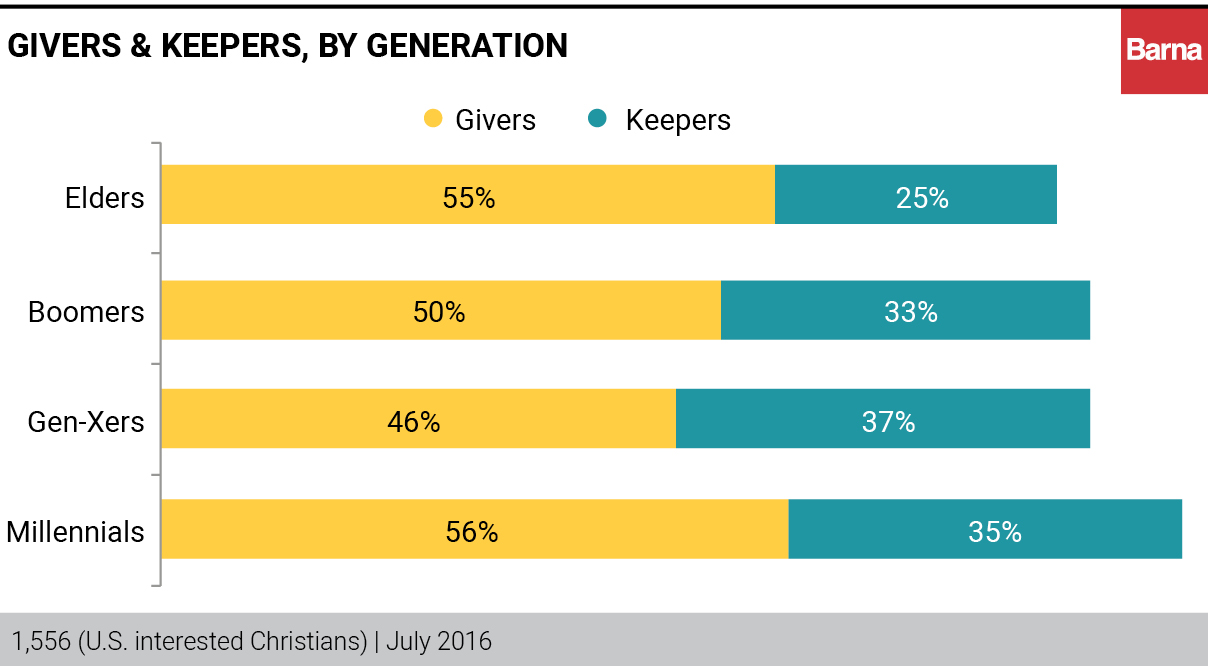Millennials are more generous with their money in some cases than older Americans, a new report says.
The study by the Barna Group examined motivations behind giving to various causes, including family needs, charitable giving and serving God. The findings led the Christian research organization to break Americans into two groups: Givers and Keepers.
“Millennials are more likely than other generations, by a significant margin, to prioritize providing for a family above other financial goals,” Barna said in an online summary of the research titled “Christians’ Financial Motivations Matter.”
Overall, Millennials lead the givers category at 56 percent, with Elders at 55 percent. They are followed by Boomers at 50 percent and Gen-Xers at 46 percent.
But it takes creativity on the part of churches and other groups to benefit from the generosity of young people.
“Generally, most younger Christians tend to be unstructured in their giving, and lean more toward spontaneous giving,” Brian Kluth, a bestselling author and founder of State of the Plate Report, told Baptist News Global.
The generation is well known for its openness in helping family members, friends, churches and numerous causes, he said. They just usually don’t do so with a financial plan.
But that often is partially the result of poor planning by churches and other organizations that depend on contributions.
“Some of it is that churches haven’t made” structured giving easy for Millennials, Kluth said.
Asking for checks or cash contributions leaves young people out because most don’t carry checkbooks or cash, he said.
Rather, they tend to operate digitally and when the impulse strikes them, Kluth added.
“We have not made it easy for Millennials to be systematic givers,” he said. “So they lean toward more spontaneous giving.”
Kluth’s 2016 State of the Plate report uncovered more evidence that congregations continue to face serious giving issues.
Almost 60 percent of churches surveyed said giving had either flat-lined or decreased from 2015 to 2016.
There were increases in giving of 5 percent or more in only 41 percent of congregations surveyed.
But Kluth said the research did not examine motives, as Barna’s has done.
Barna said it looked at American Christians who are “others-focused.” Of them, 43 percent prioritize family needs, while 23 percent give to charity and 20 percent want to serve God with their giving. Another 14 percent said they want to leave legacies for others, Barna said.
 Keepers, on the other hand, tend to focus more on themselves. Most, at 42 percent, said they want to support a lifestyle while 37 percent said their goal is to be content. Being debt free was important to 16 percent of Keepers while 5 percent want to show others how hard they work.
Keepers, on the other hand, tend to focus more on themselves. Most, at 42 percent, said they want to support a lifestyle while 37 percent said their goal is to be content. Being debt free was important to 16 percent of Keepers while 5 percent want to show others how hard they work.
Barna also found a correlation between Givers, Keepers and their financial health.
“When it comes to household income, Givers are not giving more because they make more,” according to the report. “In fact, Keepers tend to be somewhat more financially comfortable than Givers: 45 percent earn more than $75,000 per year compared to 39 percent of Givers.”
The bottom line for churches is knowing why people give — and why they don’t.
“Christians with giving goals give a lot, and Christians with keeping goals give less or not at all,” Barna said. “In short: Motivations matter.”



